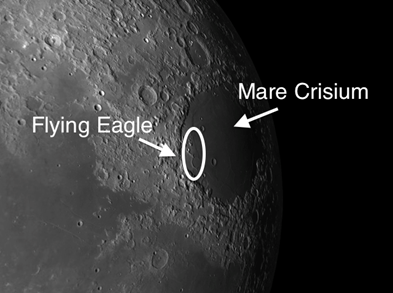This week we will highlight the wrinkle ridge Dorsum Oppel, a feature informally known as “the Flying Eagle,” viewable on Saturday evening.

 The Flying Eagle: [NE/H15] As the lava cooled following the impact that created Mare Crisium, a series of wrinkle ridges, known as Dorsum Oppel, formed along the entire western edge of Crisium and give the impression of waves lapping on the shore. The flowing lava partially filled the pre-existing craters Yerkes and Lick [H15], turning them into ghost craters. There is also a more substantial ridge that connects the flooded crater Yerkes with the smaller Yerkes E, 15 miles to its northwest (unnamed on the Field Map). Under a low Sun this ridge looks remarkably like the silhouette of a bird in flight and has been nicknamed the Flying Eagle.
The Flying Eagle: [NE/H15] As the lava cooled following the impact that created Mare Crisium, a series of wrinkle ridges, known as Dorsum Oppel, formed along the entire western edge of Crisium and give the impression of waves lapping on the shore. The flowing lava partially filled the pre-existing craters Yerkes and Lick [H15], turning them into ghost craters. There is also a more substantial ridge that connects the flooded crater Yerkes with the smaller Yerkes E, 15 miles to its northwest (unnamed on the Field Map). Under a low Sun this ridge looks remarkably like the silhouette of a bird in flight and has been nicknamed the Flying Eagle.
======================
It is highly recommended that you get a copy of Sky and Telescope’s Field Map of the Moon, the very finest Moon map available for use at the telescope. It is available for $10.95 at www.skyandtelescope.com and on Amazon. All features mentioned in this blog will be keyed to the grid on the Field Map and will look like this: Plato: [NW/D9]
Credits:
Courtesy of Gray Photography of Corpus Christi, Texas
Lunar photos: NASA / USGS / BMDO / LROC / ASU / DLR / LOLA / Moon Globe. Used by permission
- Rupes Cauchy: A Best Known Fault on the Moon - July 22, 2024
- Moon Crater Schickard – Crater Floor has Stripes - July 15, 2024
- Moon Craters Langrenus and Vandelinus - July 8, 2024